The Impact of Parental Divorce on Young Adults' Mental Health
VerifiedAdded on 2022/09/14
|26
|8318
|10
Report
AI Summary
This report explores the impact of parental divorce on the mental health and intimate relationships of young adults. The study, based on a quantitative approach using an online questionnaire, aims to determine the extent of this impact by comparing the psychological well-being and relationship quality of young adults who experienced parental separation with those who did not. The research reviews existing literature, including longitudinal and cross-sectional studies, while addressing the limitations of previous methodologies. The report hypothesizes that parental separation has a negative impact on mental health and relationships, potentially leading to differences in psychological comfort and intimate connections. The methodology involves an online survey, and the findings will contribute to understanding the long-term consequences of parental divorce on the development of young adults. The study seeks to identify whether parental separation has a more detrimental influence on young adults, concerning their psychological comfort and passionate affiliation in association to new grown-ups with no experience of parental split.
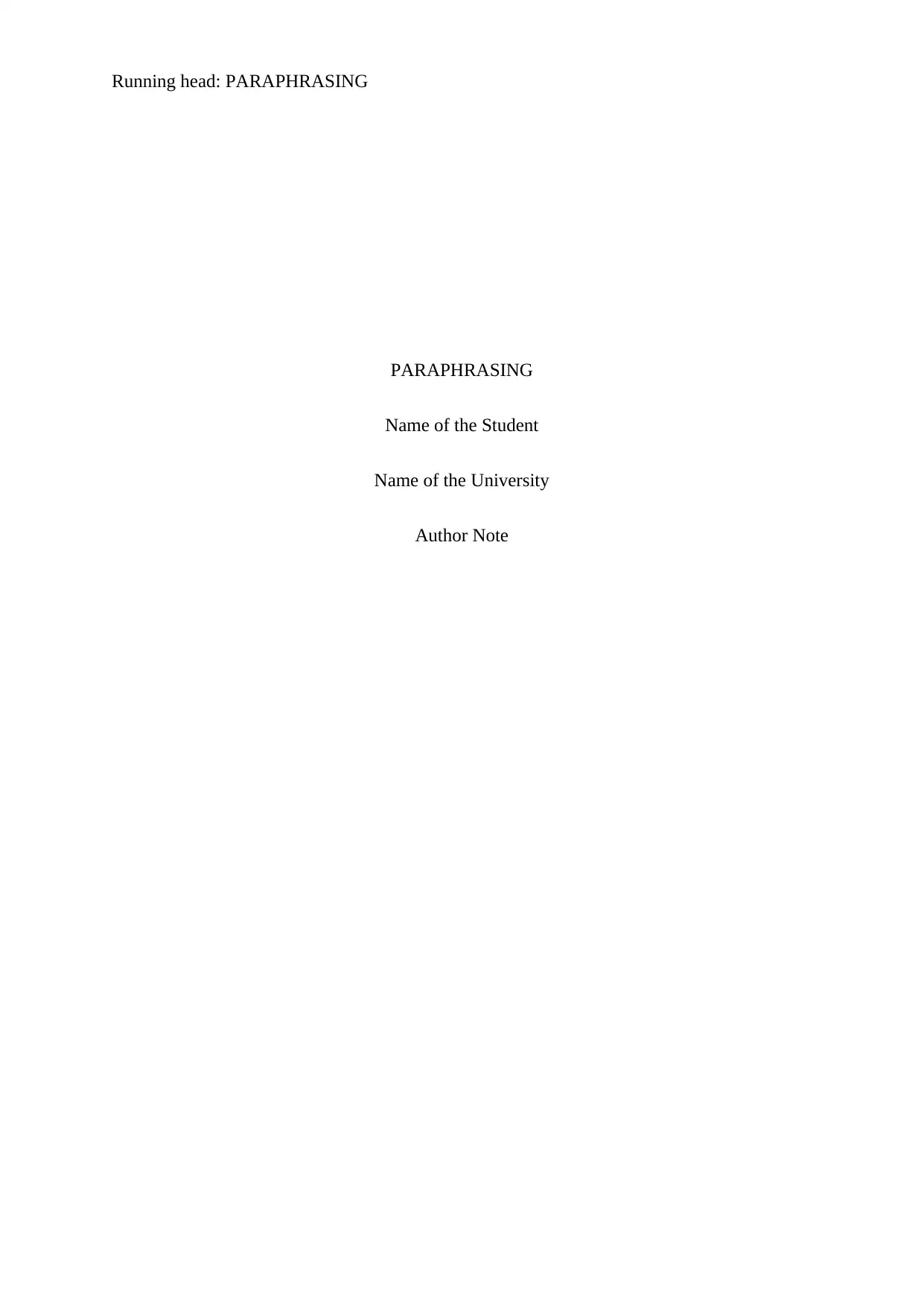
Running head: PARAPHRASING
PARAPHRASING
Name of the Student
Name of the University
Author Note
PARAPHRASING
Name of the Student
Name of the University
Author Note
Paraphrase This Document
Need a fresh take? Get an instant paraphrase of this document with our AI Paraphraser
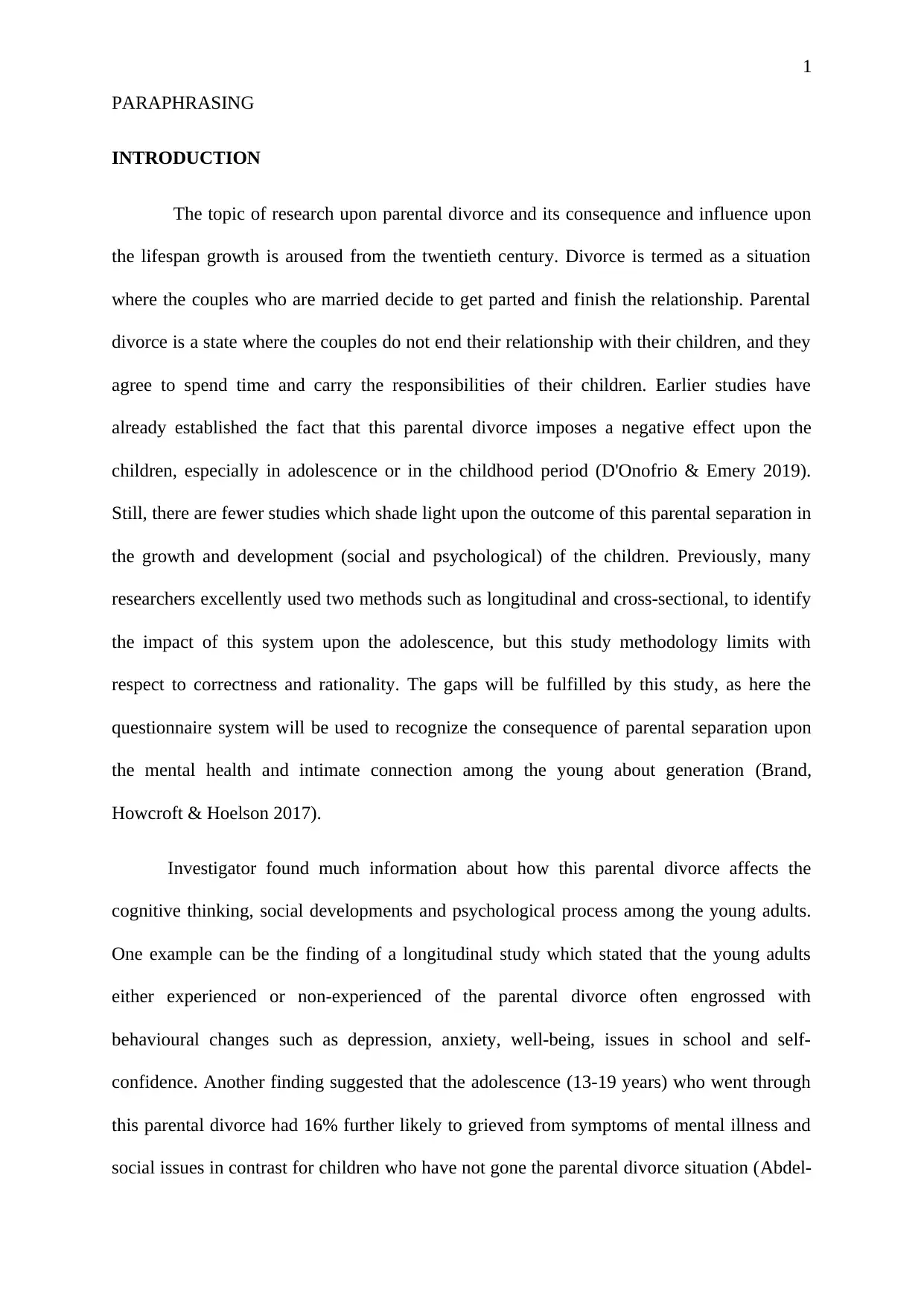
1
PARAPHRASING
INTRODUCTION
The topic of research upon parental divorce and its consequence and influence upon
the lifespan growth is aroused from the twentieth century. Divorce is termed as a situation
where the couples who are married decide to get parted and finish the relationship. Parental
divorce is a state where the couples do not end their relationship with their children, and they
agree to spend time and carry the responsibilities of their children. Earlier studies have
already established the fact that this parental divorce imposes a negative effect upon the
children, especially in adolescence or in the childhood period (D'Onofrio & Emery 2019).
Still, there are fewer studies which shade light upon the outcome of this parental separation in
the growth and development (social and psychological) of the children. Previously, many
researchers excellently used two methods such as longitudinal and cross-sectional, to identify
the impact of this system upon the adolescence, but this study methodology limits with
respect to correctness and rationality. The gaps will be fulfilled by this study, as here the
questionnaire system will be used to recognize the consequence of parental separation upon
the mental health and intimate connection among the young about generation (Brand,
Howcroft & Hoelson 2017).
Investigator found much information about how this parental divorce affects the
cognitive thinking, social developments and psychological process among the young adults.
One example can be the finding of a longitudinal study which stated that the young adults
either experienced or non-experienced of the parental divorce often engrossed with
behavioural changes such as depression, anxiety, well-being, issues in school and self-
confidence. Another finding suggested that the adolescence (13-19 years) who went through
this parental divorce had 16% further likely to grieved from symptoms of mental illness and
social issues in contrast for children who have not gone the parental divorce situation (Abdel-
PARAPHRASING
INTRODUCTION
The topic of research upon parental divorce and its consequence and influence upon
the lifespan growth is aroused from the twentieth century. Divorce is termed as a situation
where the couples who are married decide to get parted and finish the relationship. Parental
divorce is a state where the couples do not end their relationship with their children, and they
agree to spend time and carry the responsibilities of their children. Earlier studies have
already established the fact that this parental divorce imposes a negative effect upon the
children, especially in adolescence or in the childhood period (D'Onofrio & Emery 2019).
Still, there are fewer studies which shade light upon the outcome of this parental separation in
the growth and development (social and psychological) of the children. Previously, many
researchers excellently used two methods such as longitudinal and cross-sectional, to identify
the impact of this system upon the adolescence, but this study methodology limits with
respect to correctness and rationality. The gaps will be fulfilled by this study, as here the
questionnaire system will be used to recognize the consequence of parental separation upon
the mental health and intimate connection among the young about generation (Brand,
Howcroft & Hoelson 2017).
Investigator found much information about how this parental divorce affects the
cognitive thinking, social developments and psychological process among the young adults.
One example can be the finding of a longitudinal study which stated that the young adults
either experienced or non-experienced of the parental divorce often engrossed with
behavioural changes such as depression, anxiety, well-being, issues in school and self-
confidence. Another finding suggested that the adolescence (13-19 years) who went through
this parental divorce had 16% further likely to grieved from symptoms of mental illness and
social issues in contrast for children who have not gone the parental divorce situation (Abdel-
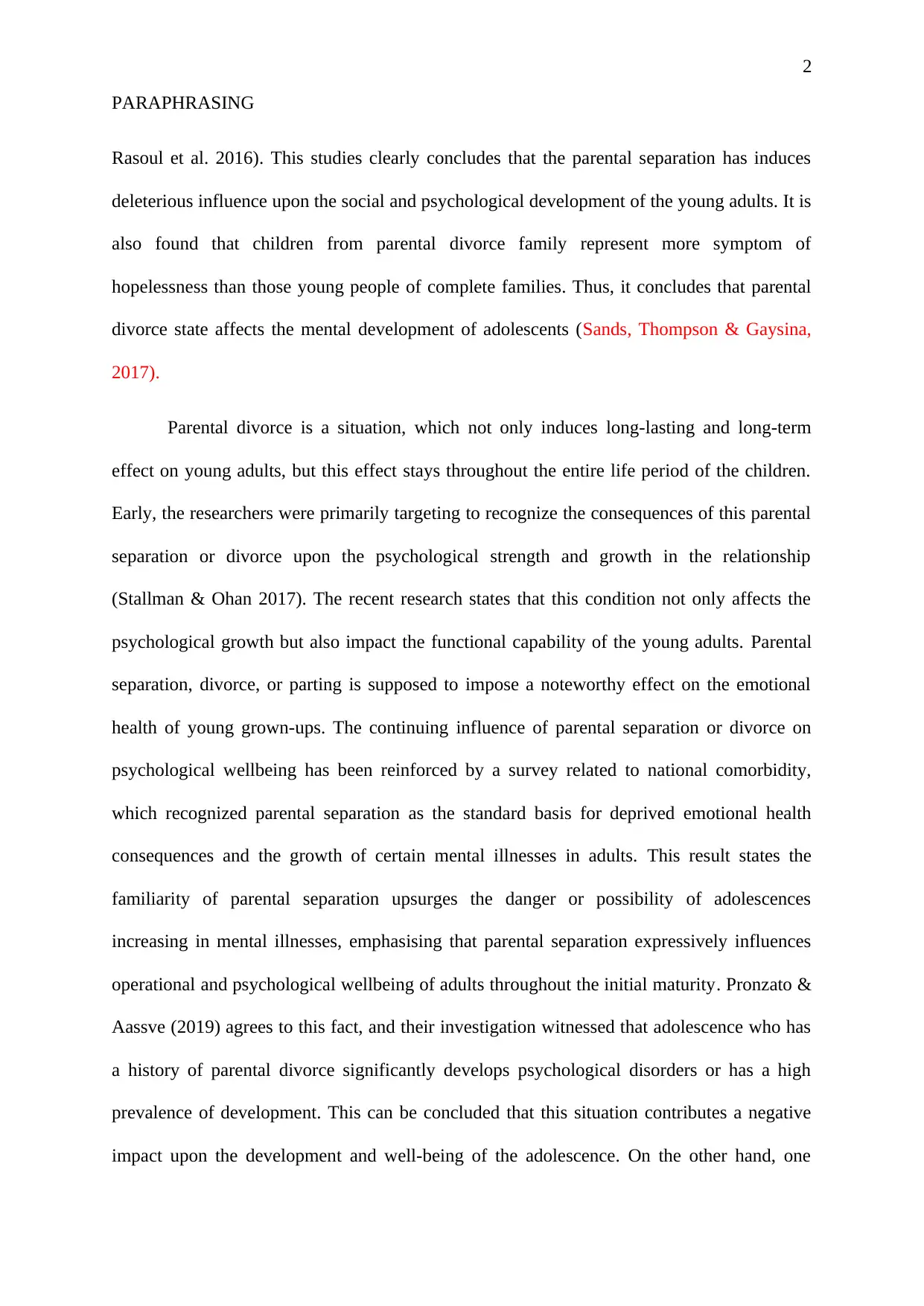
2
PARAPHRASING
Rasoul et al. 2016). This studies clearly concludes that the parental separation has induces
deleterious influence upon the social and psychological development of the young adults. It is
also found that children from parental divorce family represent more symptom of
hopelessness than those young people of complete families. Thus, it concludes that parental
divorce state affects the mental development of adolescents (Sands, Thompson & Gaysina,
2017).
Parental divorce is a situation, which not only induces long-lasting and long-term
effect on young adults, but this effect stays throughout the entire life period of the children.
Early, the researchers were primarily targeting to recognize the consequences of this parental
separation or divorce upon the psychological strength and growth in the relationship
(Stallman & Ohan 2017). The recent research states that this condition not only affects the
psychological growth but also impact the functional capability of the young adults. Parental
separation, divorce, or parting is supposed to impose a noteworthy effect on the emotional
health of young grown-ups. The continuing influence of parental separation or divorce on
psychological wellbeing has been reinforced by a survey related to national comorbidity,
which recognized parental separation as the standard basis for deprived emotional health
consequences and the growth of certain mental illnesses in adults. This result states the
familiarity of parental separation upsurges the danger or possibility of adolescences
increasing in mental illnesses, emphasising that parental separation expressively influences
operational and psychological wellbeing of adults throughout the initial maturity. Pronzato &
Aassve (2019) agrees to this fact, and their investigation witnessed that adolescence who has
a history of parental divorce significantly develops psychological disorders or has a high
prevalence of development. This can be concluded that this situation contributes a negative
impact upon the development and well-being of the adolescence. On the other hand, one
PARAPHRASING
Rasoul et al. 2016). This studies clearly concludes that the parental separation has induces
deleterious influence upon the social and psychological development of the young adults. It is
also found that children from parental divorce family represent more symptom of
hopelessness than those young people of complete families. Thus, it concludes that parental
divorce state affects the mental development of adolescents (Sands, Thompson & Gaysina,
2017).
Parental divorce is a situation, which not only induces long-lasting and long-term
effect on young adults, but this effect stays throughout the entire life period of the children.
Early, the researchers were primarily targeting to recognize the consequences of this parental
separation or divorce upon the psychological strength and growth in the relationship
(Stallman & Ohan 2017). The recent research states that this condition not only affects the
psychological growth but also impact the functional capability of the young adults. Parental
separation, divorce, or parting is supposed to impose a noteworthy effect on the emotional
health of young grown-ups. The continuing influence of parental separation or divorce on
psychological wellbeing has been reinforced by a survey related to national comorbidity,
which recognized parental separation as the standard basis for deprived emotional health
consequences and the growth of certain mental illnesses in adults. This result states the
familiarity of parental separation upsurges the danger or possibility of adolescences
increasing in mental illnesses, emphasising that parental separation expressively influences
operational and psychological wellbeing of adults throughout the initial maturity. Pronzato &
Aassve (2019) agrees to this fact, and their investigation witnessed that adolescence who has
a history of parental divorce significantly develops psychological disorders or has a high
prevalence of development. This can be concluded that this situation contributes a negative
impact upon the development and well-being of the adolescence. On the other hand, one
⊘ This is a preview!⊘
Do you want full access?
Subscribe today to unlock all pages.

Trusted by 1+ million students worldwide
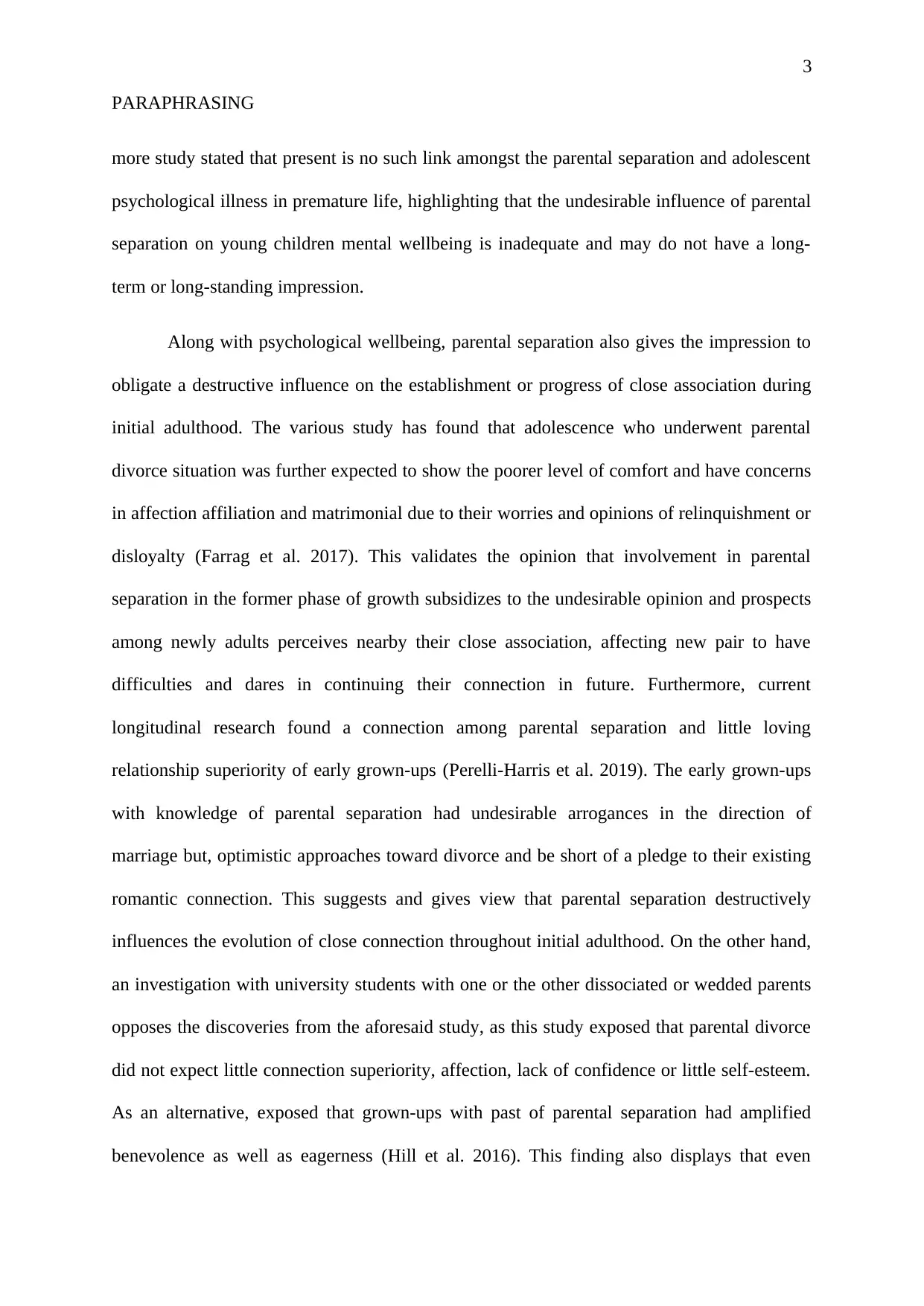
3
PARAPHRASING
more study stated that present is no such link amongst the parental separation and adolescent
psychological illness in premature life, highlighting that the undesirable influence of parental
separation on young children mental wellbeing is inadequate and may do not have a long-
term or long-standing impression.
Along with psychological wellbeing, parental separation also gives the impression to
obligate a destructive influence on the establishment or progress of close association during
initial adulthood. The various study has found that adolescence who underwent parental
divorce situation was further expected to show the poorer level of comfort and have concerns
in affection affiliation and matrimonial due to their worries and opinions of relinquishment or
disloyalty (Farrag et al. 2017). This validates the opinion that involvement in parental
separation in the former phase of growth subsidizes to the undesirable opinion and prospects
among newly adults perceives nearby their close association, affecting new pair to have
difficulties and dares in continuing their connection in future. Furthermore, current
longitudinal research found a connection among parental separation and little loving
relationship superiority of early grown-ups (Perelli-Harris et al. 2019). The early grown-ups
with knowledge of parental separation had undesirable arrogances in the direction of
marriage but, optimistic approaches toward divorce and be short of a pledge to their existing
romantic connection. This suggests and gives view that parental separation destructively
influences the evolution of close connection throughout initial adulthood. On the other hand,
an investigation with university students with one or the other dissociated or wedded parents
opposes the discoveries from the aforesaid study, as this study exposed that parental divorce
did not expect little connection superiority, affection, lack of confidence or little self-esteem.
As an alternative, exposed that grown-ups with past of parental separation had amplified
benevolence as well as eagerness (Hill et al. 2016). This finding also displays that even
PARAPHRASING
more study stated that present is no such link amongst the parental separation and adolescent
psychological illness in premature life, highlighting that the undesirable influence of parental
separation on young children mental wellbeing is inadequate and may do not have a long-
term or long-standing impression.
Along with psychological wellbeing, parental separation also gives the impression to
obligate a destructive influence on the establishment or progress of close association during
initial adulthood. The various study has found that adolescence who underwent parental
divorce situation was further expected to show the poorer level of comfort and have concerns
in affection affiliation and matrimonial due to their worries and opinions of relinquishment or
disloyalty (Farrag et al. 2017). This validates the opinion that involvement in parental
separation in the former phase of growth subsidizes to the undesirable opinion and prospects
among newly adults perceives nearby their close association, affecting new pair to have
difficulties and dares in continuing their connection in future. Furthermore, current
longitudinal research found a connection among parental separation and little loving
relationship superiority of early grown-ups (Perelli-Harris et al. 2019). The early grown-ups
with knowledge of parental separation had undesirable arrogances in the direction of
marriage but, optimistic approaches toward divorce and be short of a pledge to their existing
romantic connection. This suggests and gives view that parental separation destructively
influences the evolution of close connection throughout initial adulthood. On the other hand,
an investigation with university students with one or the other dissociated or wedded parents
opposes the discoveries from the aforesaid study, as this study exposed that parental divorce
did not expect little connection superiority, affection, lack of confidence or little self-esteem.
As an alternative, exposed that grown-ups with past of parental separation had amplified
benevolence as well as eagerness (Hill et al. 2016). This finding also displays that even
Paraphrase This Document
Need a fresh take? Get an instant paraphrase of this document with our AI Paraphraser
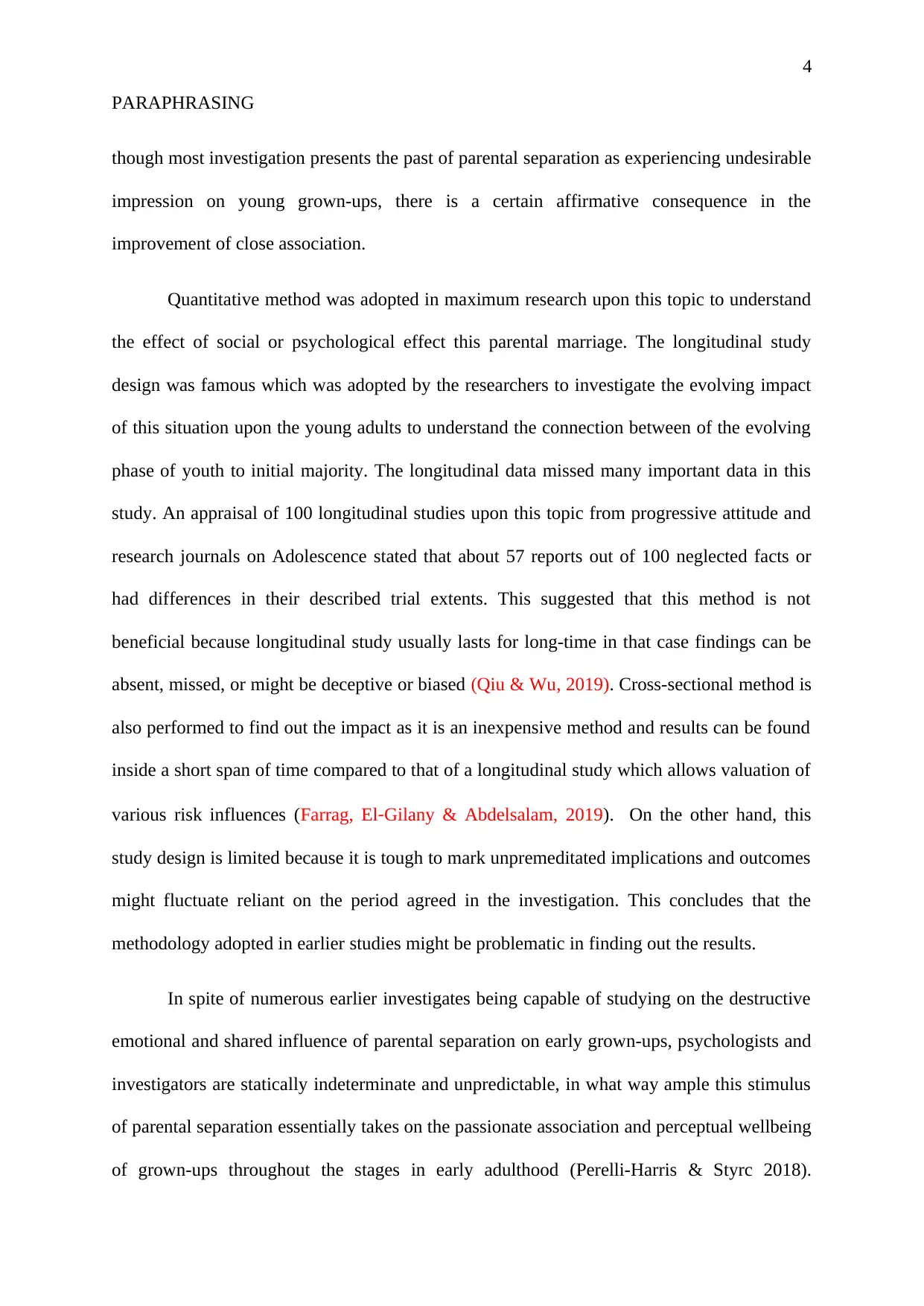
4
PARAPHRASING
though most investigation presents the past of parental separation as experiencing undesirable
impression on young grown-ups, there is a certain affirmative consequence in the
improvement of close association.
Quantitative method was adopted in maximum research upon this topic to understand
the effect of social or psychological effect this parental marriage. The longitudinal study
design was famous which was adopted by the researchers to investigate the evolving impact
of this situation upon the young adults to understand the connection between of the evolving
phase of youth to initial majority. The longitudinal data missed many important data in this
study. An appraisal of 100 longitudinal studies upon this topic from progressive attitude and
research journals on Adolescence stated that about 57 reports out of 100 neglected facts or
had differences in their described trial extents. This suggested that this method is not
beneficial because longitudinal study usually lasts for long-time in that case findings can be
absent, missed, or might be deceptive or biased (Qiu & Wu, 2019). Cross-sectional method is
also performed to find out the impact as it is an inexpensive method and results can be found
inside a short span of time compared to that of a longitudinal study which allows valuation of
various risk influences (Farrag, El‐Gilany & Abdelsalam, 2019). On the other hand, this
study design is limited because it is tough to mark unpremeditated implications and outcomes
might fluctuate reliant on the period agreed in the investigation. This concludes that the
methodology adopted in earlier studies might be problematic in finding out the results.
In spite of numerous earlier investigates being capable of studying on the destructive
emotional and shared influence of parental separation on early grown-ups, psychologists and
investigators are statically indeterminate and unpredictable, in what way ample this stimulus
of parental separation essentially takes on the passionate association and perceptual wellbeing
of grown-ups throughout the stages in early adulthood (Perelli‐Harris & Styrc 2018).
PARAPHRASING
though most investigation presents the past of parental separation as experiencing undesirable
impression on young grown-ups, there is a certain affirmative consequence in the
improvement of close association.
Quantitative method was adopted in maximum research upon this topic to understand
the effect of social or psychological effect this parental marriage. The longitudinal study
design was famous which was adopted by the researchers to investigate the evolving impact
of this situation upon the young adults to understand the connection between of the evolving
phase of youth to initial majority. The longitudinal data missed many important data in this
study. An appraisal of 100 longitudinal studies upon this topic from progressive attitude and
research journals on Adolescence stated that about 57 reports out of 100 neglected facts or
had differences in their described trial extents. This suggested that this method is not
beneficial because longitudinal study usually lasts for long-time in that case findings can be
absent, missed, or might be deceptive or biased (Qiu & Wu, 2019). Cross-sectional method is
also performed to find out the impact as it is an inexpensive method and results can be found
inside a short span of time compared to that of a longitudinal study which allows valuation of
various risk influences (Farrag, El‐Gilany & Abdelsalam, 2019). On the other hand, this
study design is limited because it is tough to mark unpremeditated implications and outcomes
might fluctuate reliant on the period agreed in the investigation. This concludes that the
methodology adopted in earlier studies might be problematic in finding out the results.
In spite of numerous earlier investigates being capable of studying on the destructive
emotional and shared influence of parental separation on early grown-ups, psychologists and
investigators are statically indeterminate and unpredictable, in what way ample this stimulus
of parental separation essentially takes on the passionate association and perceptual wellbeing
of grown-ups throughout the stages in early adulthood (Perelli‐Harris & Styrc 2018).
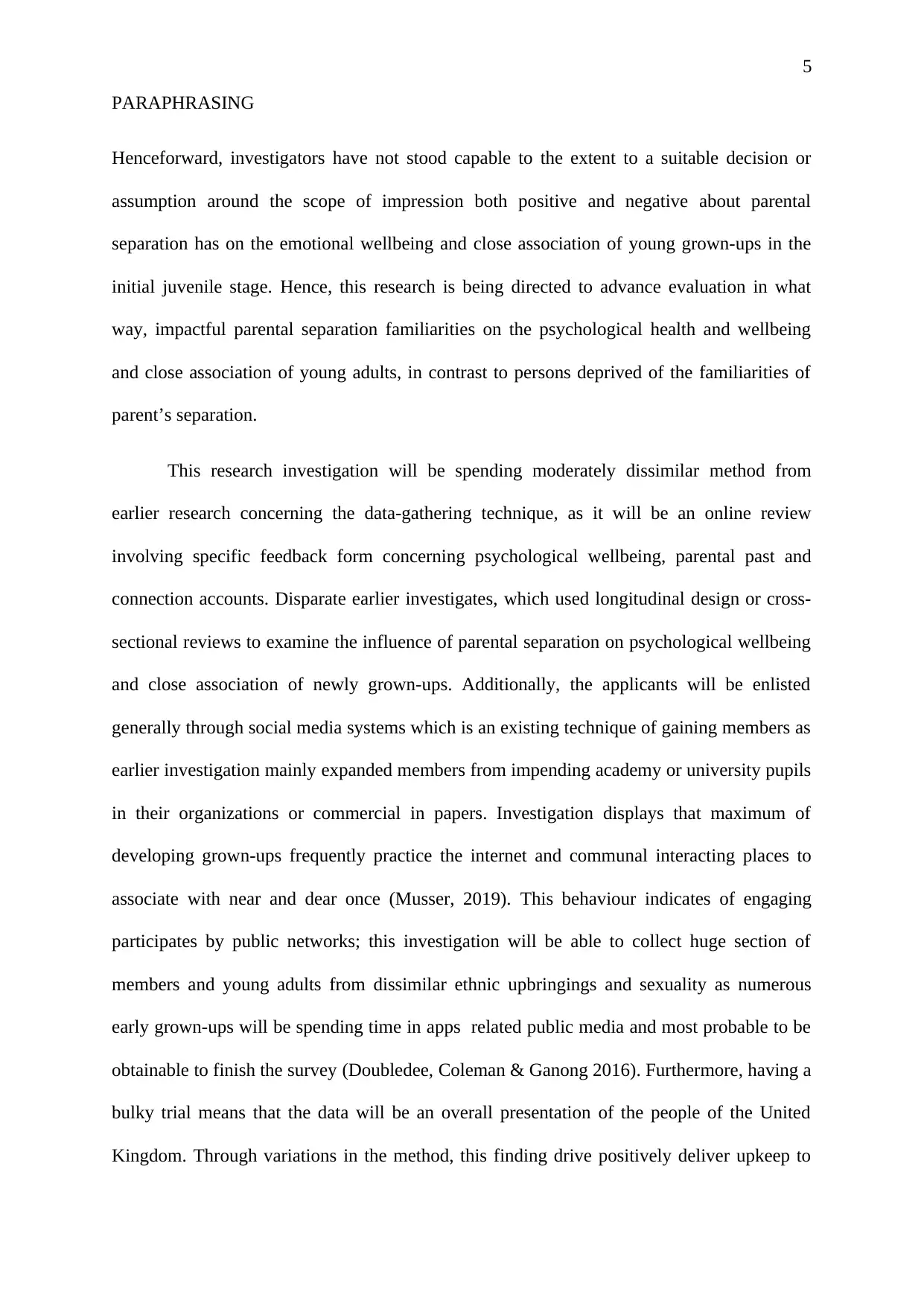
5
PARAPHRASING
Henceforward, investigators have not stood capable to the extent to a suitable decision or
assumption around the scope of impression both positive and negative about parental
separation has on the emotional wellbeing and close association of young grown-ups in the
initial juvenile stage. Hence, this research is being directed to advance evaluation in what
way, impactful parental separation familiarities on the psychological health and wellbeing
and close association of young adults, in contrast to persons deprived of the familiarities of
parent’s separation.
This research investigation will be spending moderately dissimilar method from
earlier research concerning the data-gathering technique, as it will be an online review
involving specific feedback form concerning psychological wellbeing, parental past and
connection accounts. Disparate earlier investigates, which used longitudinal design or cross-
sectional reviews to examine the influence of parental separation on psychological wellbeing
and close association of newly grown-ups. Additionally, the applicants will be enlisted
generally through social media systems which is an existing technique of gaining members as
earlier investigation mainly expanded members from impending academy or university pupils
in their organizations or commercial in papers. Investigation displays that maximum of
developing grown-ups frequently practice the internet and communal interacting places to
associate with near and dear once (Musser, 2019). This behaviour indicates of engaging
participates by public networks; this investigation will be able to collect huge section of
members and young adults from dissimilar ethnic upbringings and sexuality as numerous
early grown-ups will be spending time in apps related public media and most probable to be
obtainable to finish the survey (Doubledee, Coleman & Ganong 2016). Furthermore, having a
bulky trial means that the data will be an overall presentation of the people of the United
Kingdom. Through variations in the method, this finding drive positively deliver upkeep to
PARAPHRASING
Henceforward, investigators have not stood capable to the extent to a suitable decision or
assumption around the scope of impression both positive and negative about parental
separation has on the emotional wellbeing and close association of young grown-ups in the
initial juvenile stage. Hence, this research is being directed to advance evaluation in what
way, impactful parental separation familiarities on the psychological health and wellbeing
and close association of young adults, in contrast to persons deprived of the familiarities of
parent’s separation.
This research investigation will be spending moderately dissimilar method from
earlier research concerning the data-gathering technique, as it will be an online review
involving specific feedback form concerning psychological wellbeing, parental past and
connection accounts. Disparate earlier investigates, which used longitudinal design or cross-
sectional reviews to examine the influence of parental separation on psychological wellbeing
and close association of newly grown-ups. Additionally, the applicants will be enlisted
generally through social media systems which is an existing technique of gaining members as
earlier investigation mainly expanded members from impending academy or university pupils
in their organizations or commercial in papers. Investigation displays that maximum of
developing grown-ups frequently practice the internet and communal interacting places to
associate with near and dear once (Musser, 2019). This behaviour indicates of engaging
participates by public networks; this investigation will be able to collect huge section of
members and young adults from dissimilar ethnic upbringings and sexuality as numerous
early grown-ups will be spending time in apps related public media and most probable to be
obtainable to finish the survey (Doubledee, Coleman & Ganong 2016). Furthermore, having a
bulky trial means that the data will be an overall presentation of the people of the United
Kingdom. Through variations in the method, this finding drive positively deliver upkeep to
⊘ This is a preview!⊘
Do you want full access?
Subscribe today to unlock all pages.

Trusted by 1+ million students worldwide
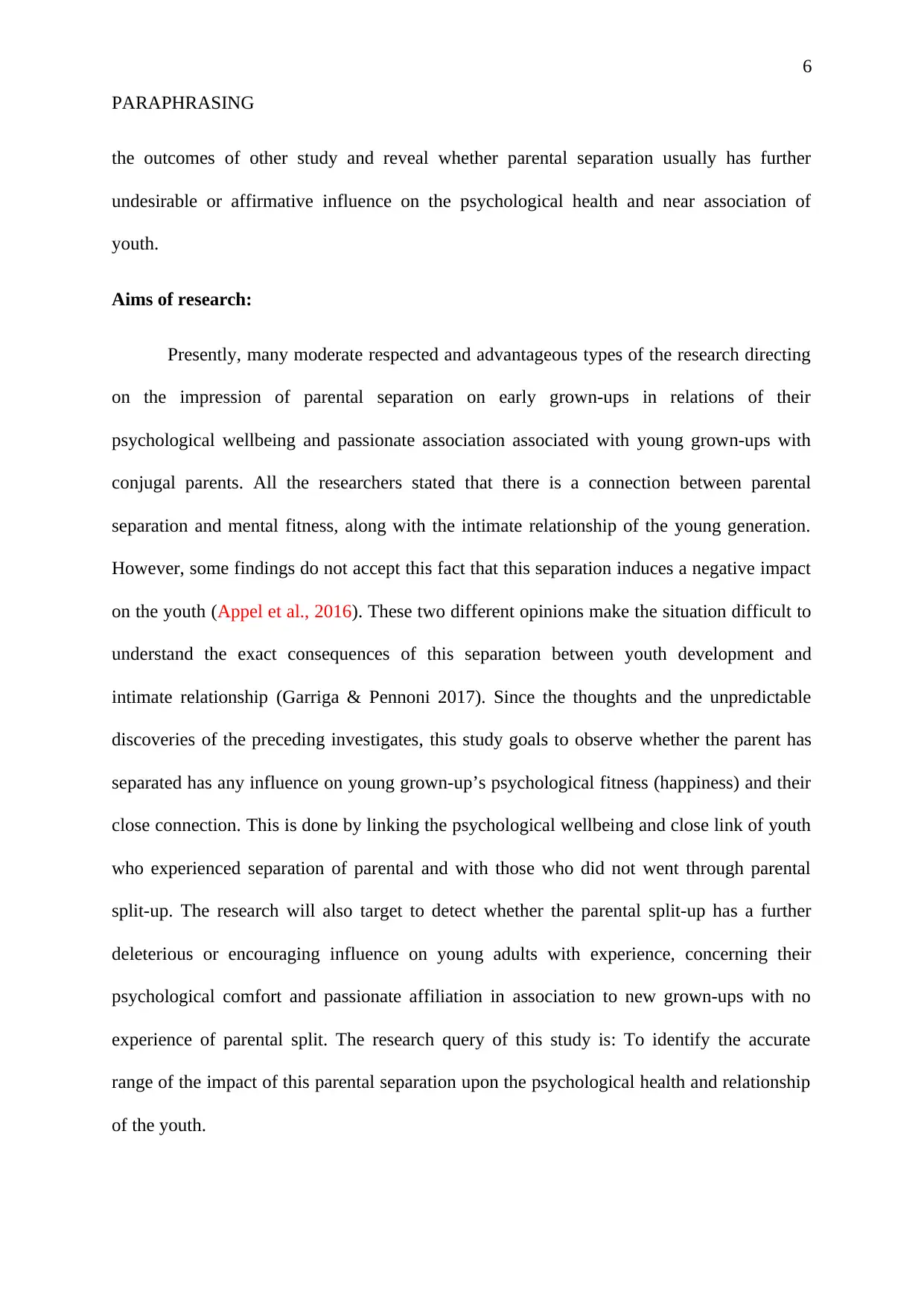
6
PARAPHRASING
the outcomes of other study and reveal whether parental separation usually has further
undesirable or affirmative influence on the psychological health and near association of
youth.
Aims of research:
Presently, many moderate respected and advantageous types of the research directing
on the impression of parental separation on early grown-ups in relations of their
psychological wellbeing and passionate association associated with young grown-ups with
conjugal parents. All the researchers stated that there is a connection between parental
separation and mental fitness, along with the intimate relationship of the young generation.
However, some findings do not accept this fact that this separation induces a negative impact
on the youth (Appel et al., 2016). These two different opinions make the situation difficult to
understand the exact consequences of this separation between youth development and
intimate relationship (Garriga & Pennoni 2017). Since the thoughts and the unpredictable
discoveries of the preceding investigates, this study goals to observe whether the parent has
separated has any influence on young grown-up’s psychological fitness (happiness) and their
close connection. This is done by linking the psychological wellbeing and close link of youth
who experienced separation of parental and with those who did not went through parental
split-up. The research will also target to detect whether the parental split-up has a further
deleterious or encouraging influence on young adults with experience, concerning their
psychological comfort and passionate affiliation in association to new grown-ups with no
experience of parental split. The research query of this study is: To identify the accurate
range of the impact of this parental separation upon the psychological health and relationship
of the youth.
PARAPHRASING
the outcomes of other study and reveal whether parental separation usually has further
undesirable or affirmative influence on the psychological health and near association of
youth.
Aims of research:
Presently, many moderate respected and advantageous types of the research directing
on the impression of parental separation on early grown-ups in relations of their
psychological wellbeing and passionate association associated with young grown-ups with
conjugal parents. All the researchers stated that there is a connection between parental
separation and mental fitness, along with the intimate relationship of the young generation.
However, some findings do not accept this fact that this separation induces a negative impact
on the youth (Appel et al., 2016). These two different opinions make the situation difficult to
understand the exact consequences of this separation between youth development and
intimate relationship (Garriga & Pennoni 2017). Since the thoughts and the unpredictable
discoveries of the preceding investigates, this study goals to observe whether the parent has
separated has any influence on young grown-up’s psychological fitness (happiness) and their
close connection. This is done by linking the psychological wellbeing and close link of youth
who experienced separation of parental and with those who did not went through parental
split-up. The research will also target to detect whether the parental split-up has a further
deleterious or encouraging influence on young adults with experience, concerning their
psychological comfort and passionate affiliation in association to new grown-ups with no
experience of parental split. The research query of this study is: To identify the accurate
range of the impact of this parental separation upon the psychological health and relationship
of the youth.
Paraphrase This Document
Need a fresh take? Get an instant paraphrase of this document with our AI Paraphraser
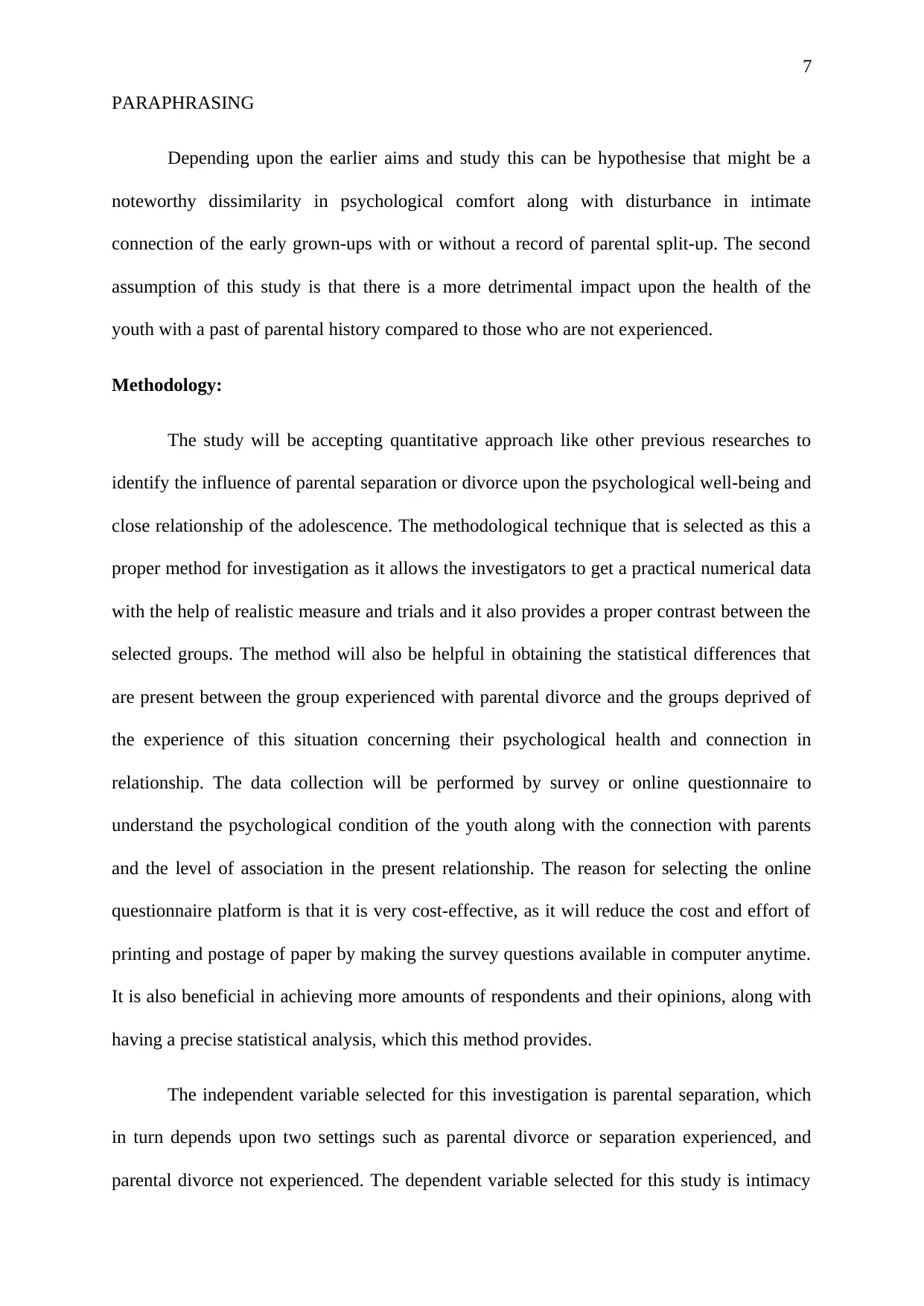
7
PARAPHRASING
Depending upon the earlier aims and study this can be hypothesise that might be a
noteworthy dissimilarity in psychological comfort along with disturbance in intimate
connection of the early grown-ups with or without a record of parental split-up. The second
assumption of this study is that there is a more detrimental impact upon the health of the
youth with a past of parental history compared to those who are not experienced.
Methodology:
The study will be accepting quantitative approach like other previous researches to
identify the influence of parental separation or divorce upon the psychological well-being and
close relationship of the adolescence. The methodological technique that is selected as this a
proper method for investigation as it allows the investigators to get a practical numerical data
with the help of realistic measure and trials and it also provides a proper contrast between the
selected groups. The method will also be helpful in obtaining the statistical differences that
are present between the group experienced with parental divorce and the groups deprived of
the experience of this situation concerning their psychological health and connection in
relationship. The data collection will be performed by survey or online questionnaire to
understand the psychological condition of the youth along with the connection with parents
and the level of association in the present relationship. The reason for selecting the online
questionnaire platform is that it is very cost-effective, as it will reduce the cost and effort of
printing and postage of paper by making the survey questions available in computer anytime.
It is also beneficial in achieving more amounts of respondents and their opinions, along with
having a precise statistical analysis, which this method provides.
The independent variable selected for this investigation is parental separation, which
in turn depends upon two settings such as parental divorce or separation experienced, and
parental divorce not experienced. The dependent variable selected for this study is intimacy
PARAPHRASING
Depending upon the earlier aims and study this can be hypothesise that might be a
noteworthy dissimilarity in psychological comfort along with disturbance in intimate
connection of the early grown-ups with or without a record of parental split-up. The second
assumption of this study is that there is a more detrimental impact upon the health of the
youth with a past of parental history compared to those who are not experienced.
Methodology:
The study will be accepting quantitative approach like other previous researches to
identify the influence of parental separation or divorce upon the psychological well-being and
close relationship of the adolescence. The methodological technique that is selected as this a
proper method for investigation as it allows the investigators to get a practical numerical data
with the help of realistic measure and trials and it also provides a proper contrast between the
selected groups. The method will also be helpful in obtaining the statistical differences that
are present between the group experienced with parental divorce and the groups deprived of
the experience of this situation concerning their psychological health and connection in
relationship. The data collection will be performed by survey or online questionnaire to
understand the psychological condition of the youth along with the connection with parents
and the level of association in the present relationship. The reason for selecting the online
questionnaire platform is that it is very cost-effective, as it will reduce the cost and effort of
printing and postage of paper by making the survey questions available in computer anytime.
It is also beneficial in achieving more amounts of respondents and their opinions, along with
having a precise statistical analysis, which this method provides.
The independent variable selected for this investigation is parental separation, which
in turn depends upon two settings such as parental divorce or separation experienced, and
parental divorce not experienced. The dependent variable selected for this study is intimacy
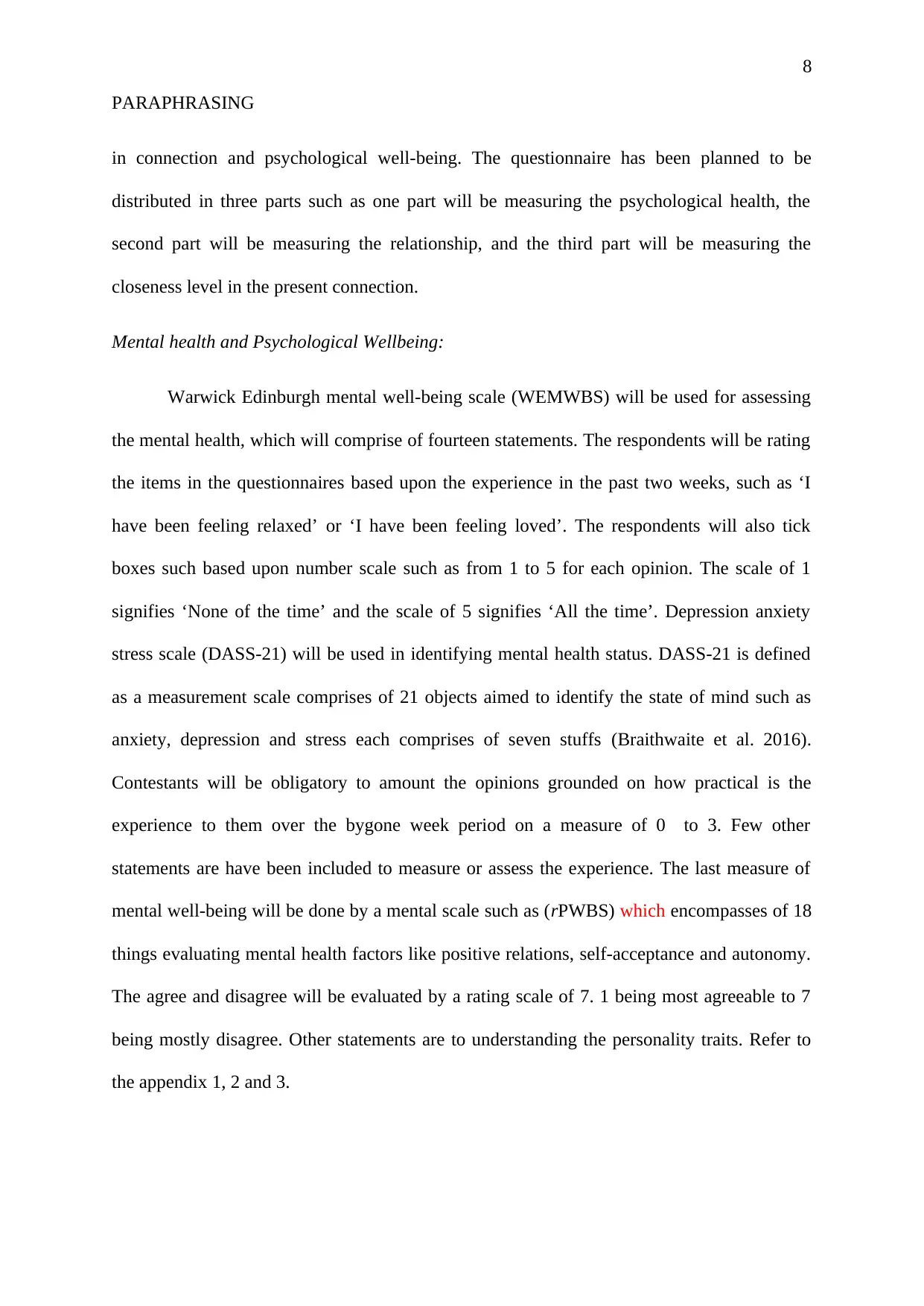
8
PARAPHRASING
in connection and psychological well-being. The questionnaire has been planned to be
distributed in three parts such as one part will be measuring the psychological health, the
second part will be measuring the relationship, and the third part will be measuring the
closeness level in the present connection.
Mental health and Psychological Wellbeing:
Warwick Edinburgh mental well-being scale (WEMWBS) will be used for assessing
the mental health, which will comprise of fourteen statements. The respondents will be rating
the items in the questionnaires based upon the experience in the past two weeks, such as ‘I
have been feeling relaxed’ or ‘I have been feeling loved’. The respondents will also tick
boxes such based upon number scale such as from 1 to 5 for each opinion. The scale of 1
signifies ‘None of the time’ and the scale of 5 signifies ‘All the time’. Depression anxiety
stress scale (DASS-21) will be used in identifying mental health status. DASS-21 is defined
as a measurement scale comprises of 21 objects aimed to identify the state of mind such as
anxiety, depression and stress each comprises of seven stuffs (Braithwaite et al. 2016).
Contestants will be obligatory to amount the opinions grounded on how practical is the
experience to them over the bygone week period on a measure of 0 to 3. Few other
statements are have been included to measure or assess the experience. The last measure of
mental well-being will be done by a mental scale such as (rPWBS) which encompasses of 18
things evaluating mental health factors like positive relations, self-acceptance and autonomy.
The agree and disagree will be evaluated by a rating scale of 7. 1 being most agreeable to 7
being mostly disagree. Other statements are to understanding the personality traits. Refer to
the appendix 1, 2 and 3.
PARAPHRASING
in connection and psychological well-being. The questionnaire has been planned to be
distributed in three parts such as one part will be measuring the psychological health, the
second part will be measuring the relationship, and the third part will be measuring the
closeness level in the present connection.
Mental health and Psychological Wellbeing:
Warwick Edinburgh mental well-being scale (WEMWBS) will be used for assessing
the mental health, which will comprise of fourteen statements. The respondents will be rating
the items in the questionnaires based upon the experience in the past two weeks, such as ‘I
have been feeling relaxed’ or ‘I have been feeling loved’. The respondents will also tick
boxes such based upon number scale such as from 1 to 5 for each opinion. The scale of 1
signifies ‘None of the time’ and the scale of 5 signifies ‘All the time’. Depression anxiety
stress scale (DASS-21) will be used in identifying mental health status. DASS-21 is defined
as a measurement scale comprises of 21 objects aimed to identify the state of mind such as
anxiety, depression and stress each comprises of seven stuffs (Braithwaite et al. 2016).
Contestants will be obligatory to amount the opinions grounded on how practical is the
experience to them over the bygone week period on a measure of 0 to 3. Few other
statements are have been included to measure or assess the experience. The last measure of
mental well-being will be done by a mental scale such as (rPWBS) which encompasses of 18
things evaluating mental health factors like positive relations, self-acceptance and autonomy.
The agree and disagree will be evaluated by a rating scale of 7. 1 being most agreeable to 7
being mostly disagree. Other statements are to understanding the personality traits. Refer to
the appendix 1, 2 and 3.
⊘ This is a preview!⊘
Do you want full access?
Subscribe today to unlock all pages.

Trusted by 1+ million students worldwide
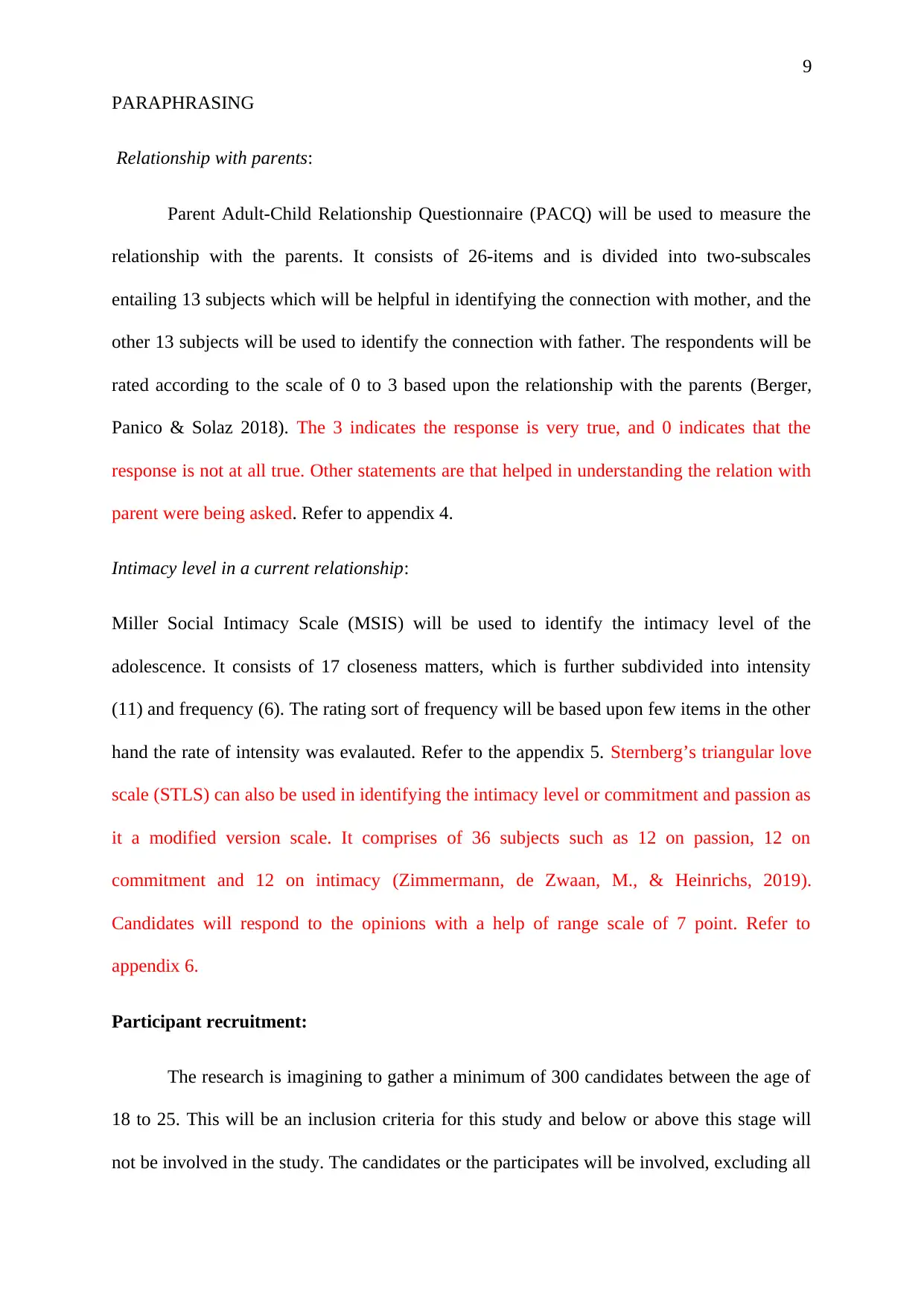
9
PARAPHRASING
Relationship with parents:
Parent Adult-Child Relationship Questionnaire (PACQ) will be used to measure the
relationship with the parents. It consists of 26-items and is divided into two-subscales
entailing 13 subjects which will be helpful in identifying the connection with mother, and the
other 13 subjects will be used to identify the connection with father. The respondents will be
rated according to the scale of 0 to 3 based upon the relationship with the parents (Berger,
Panico & Solaz 2018). The 3 indicates the response is very true, and 0 indicates that the
response is not at all true. Other statements are that helped in understanding the relation with
parent were being asked. Refer to appendix 4.
Intimacy level in a current relationship:
Miller Social Intimacy Scale (MSIS) will be used to identify the intimacy level of the
adolescence. It consists of 17 closeness matters, which is further subdivided into intensity
(11) and frequency (6). The rating sort of frequency will be based upon few items in the other
hand the rate of intensity was evalauted. Refer to the appendix 5. Sternberg’s triangular love
scale (STLS) can also be used in identifying the intimacy level or commitment and passion as
it a modified version scale. It comprises of 36 subjects such as 12 on passion, 12 on
commitment and 12 on intimacy (Zimmermann, de Zwaan, M., & Heinrichs, 2019).
Candidates will respond to the opinions with a help of range scale of 7 point. Refer to
appendix 6.
Participant recruitment:
The research is imagining to gather a minimum of 300 candidates between the age of
18 to 25. This will be an inclusion criteria for this study and below or above this stage will
not be involved in the study. The candidates or the participates will be involved, excluding all
PARAPHRASING
Relationship with parents:
Parent Adult-Child Relationship Questionnaire (PACQ) will be used to measure the
relationship with the parents. It consists of 26-items and is divided into two-subscales
entailing 13 subjects which will be helpful in identifying the connection with mother, and the
other 13 subjects will be used to identify the connection with father. The respondents will be
rated according to the scale of 0 to 3 based upon the relationship with the parents (Berger,
Panico & Solaz 2018). The 3 indicates the response is very true, and 0 indicates that the
response is not at all true. Other statements are that helped in understanding the relation with
parent were being asked. Refer to appendix 4.
Intimacy level in a current relationship:
Miller Social Intimacy Scale (MSIS) will be used to identify the intimacy level of the
adolescence. It consists of 17 closeness matters, which is further subdivided into intensity
(11) and frequency (6). The rating sort of frequency will be based upon few items in the other
hand the rate of intensity was evalauted. Refer to the appendix 5. Sternberg’s triangular love
scale (STLS) can also be used in identifying the intimacy level or commitment and passion as
it a modified version scale. It comprises of 36 subjects such as 12 on passion, 12 on
commitment and 12 on intimacy (Zimmermann, de Zwaan, M., & Heinrichs, 2019).
Candidates will respond to the opinions with a help of range scale of 7 point. Refer to
appendix 6.
Participant recruitment:
The research is imagining to gather a minimum of 300 candidates between the age of
18 to 25. This will be an inclusion criteria for this study and below or above this stage will
not be involved in the study. The candidates or the participates will be involved, excluding all
Paraphrase This Document
Need a fresh take? Get an instant paraphrase of this document with our AI Paraphraser
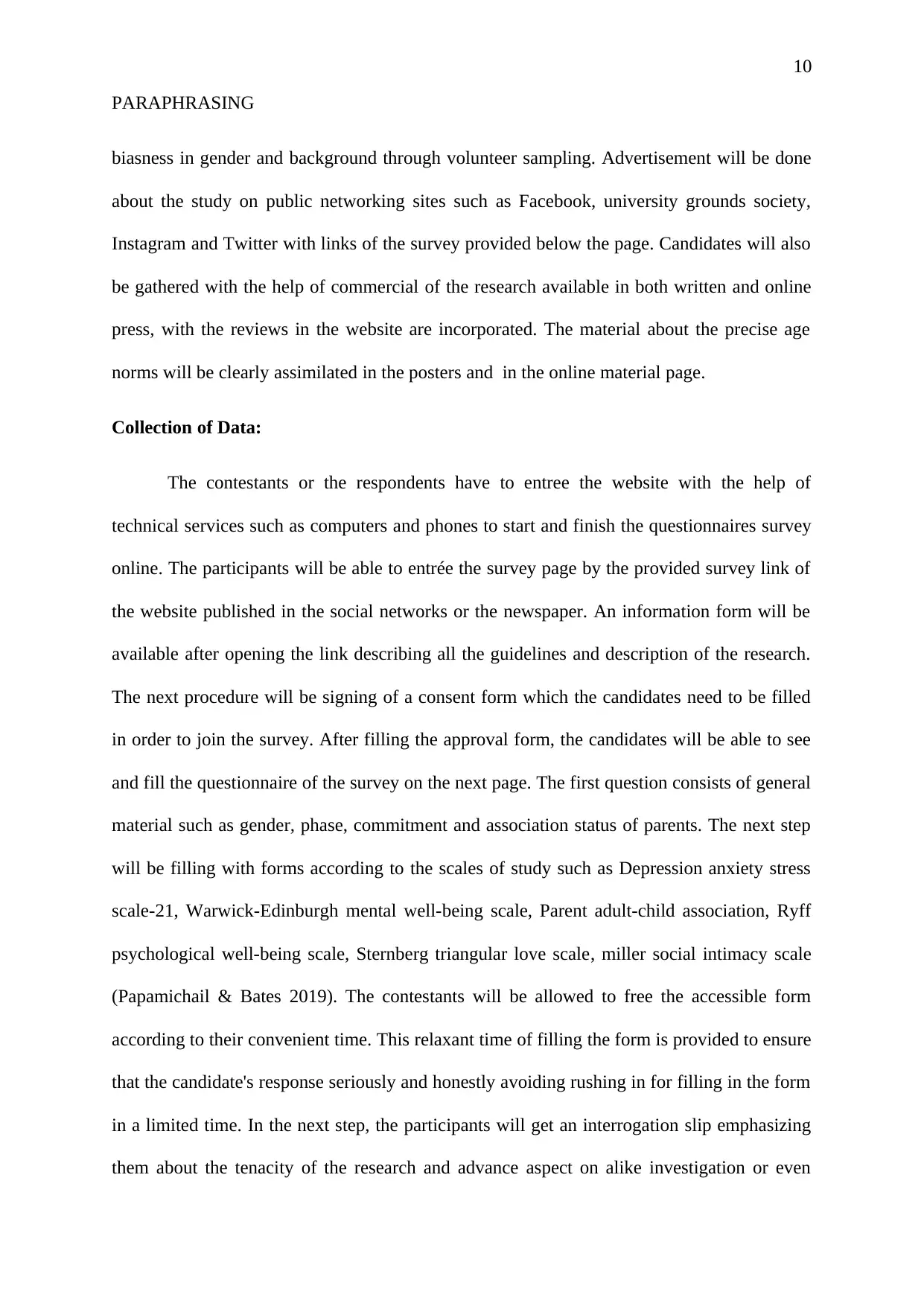
10
PARAPHRASING
biasness in gender and background through volunteer sampling. Advertisement will be done
about the study on public networking sites such as Facebook, university grounds society,
Instagram and Twitter with links of the survey provided below the page. Candidates will also
be gathered with the help of commercial of the research available in both written and online
press, with the reviews in the website are incorporated. The material about the precise age
norms will be clearly assimilated in the posters and in the online material page.
Collection of Data:
The contestants or the respondents have to entree the website with the help of
technical services such as computers and phones to start and finish the questionnaires survey
online. The participants will be able to entrée the survey page by the provided survey link of
the website published in the social networks or the newspaper. An information form will be
available after opening the link describing all the guidelines and description of the research.
The next procedure will be signing of a consent form which the candidates need to be filled
in order to join the survey. After filling the approval form, the candidates will be able to see
and fill the questionnaire of the survey on the next page. The first question consists of general
material such as gender, phase, commitment and association status of parents. The next step
will be filling with forms according to the scales of study such as Depression anxiety stress
scale-21, Warwick-Edinburgh mental well-being scale, Parent adult-child association, Ryff
psychological well-being scale, Sternberg triangular love scale, miller social intimacy scale
(Papamichail & Bates 2019). The contestants will be allowed to free the accessible form
according to their convenient time. This relaxant time of filling the form is provided to ensure
that the candidate's response seriously and honestly avoiding rushing in for filling in the form
in a limited time. In the next step, the participants will get an interrogation slip emphasizing
them about the tenacity of the research and advance aspect on alike investigation or even
PARAPHRASING
biasness in gender and background through volunteer sampling. Advertisement will be done
about the study on public networking sites such as Facebook, university grounds society,
Instagram and Twitter with links of the survey provided below the page. Candidates will also
be gathered with the help of commercial of the research available in both written and online
press, with the reviews in the website are incorporated. The material about the precise age
norms will be clearly assimilated in the posters and in the online material page.
Collection of Data:
The contestants or the respondents have to entree the website with the help of
technical services such as computers and phones to start and finish the questionnaires survey
online. The participants will be able to entrée the survey page by the provided survey link of
the website published in the social networks or the newspaper. An information form will be
available after opening the link describing all the guidelines and description of the research.
The next procedure will be signing of a consent form which the candidates need to be filled
in order to join the survey. After filling the approval form, the candidates will be able to see
and fill the questionnaire of the survey on the next page. The first question consists of general
material such as gender, phase, commitment and association status of parents. The next step
will be filling with forms according to the scales of study such as Depression anxiety stress
scale-21, Warwick-Edinburgh mental well-being scale, Parent adult-child association, Ryff
psychological well-being scale, Sternberg triangular love scale, miller social intimacy scale
(Papamichail & Bates 2019). The contestants will be allowed to free the accessible form
according to their convenient time. This relaxant time of filling the form is provided to ensure
that the candidate's response seriously and honestly avoiding rushing in for filling in the form
in a limited time. In the next step, the participants will get an interrogation slip emphasizing
them about the tenacity of the research and advance aspect on alike investigation or even
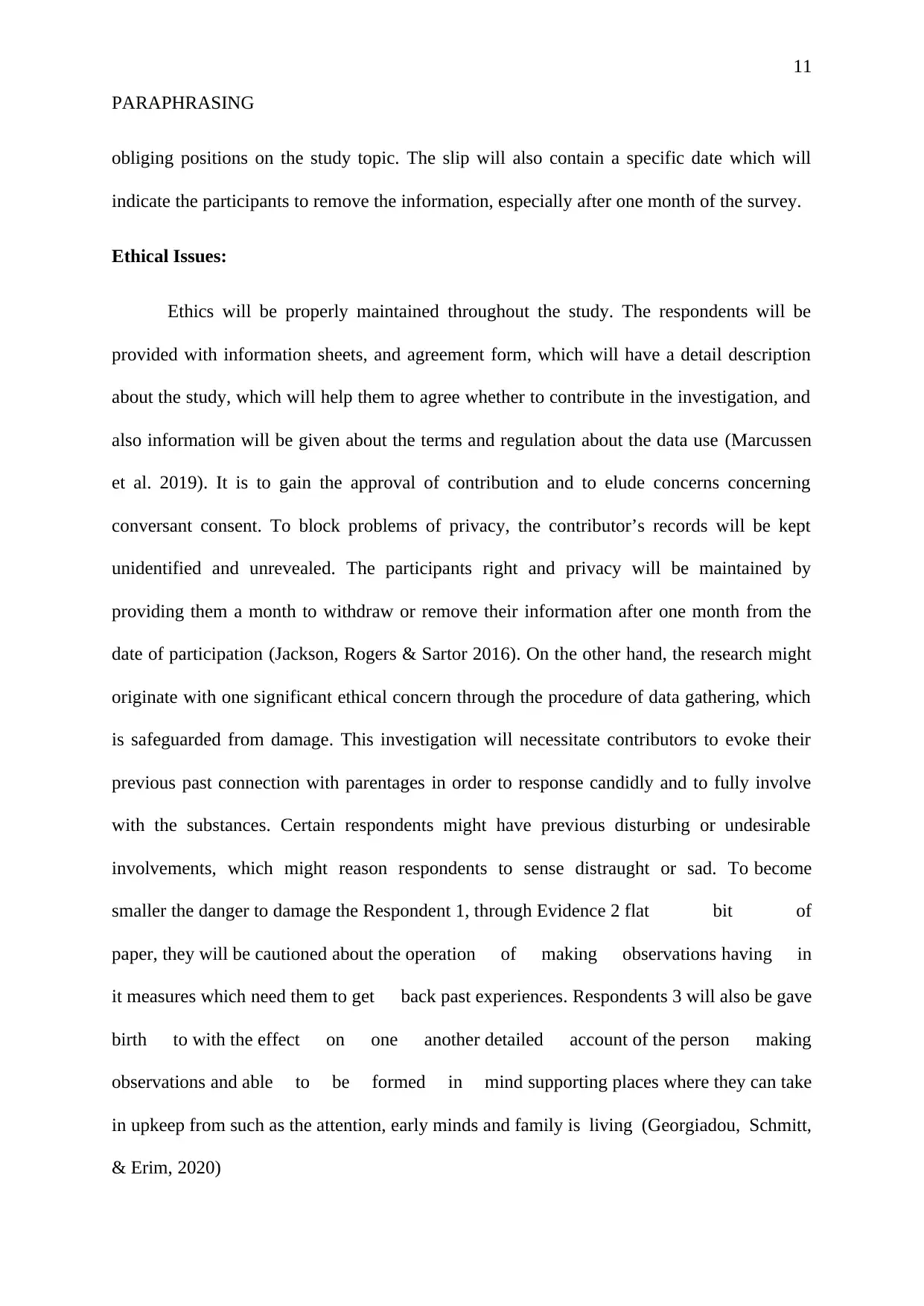
11
PARAPHRASING
obliging positions on the study topic. The slip will also contain a specific date which will
indicate the participants to remove the information, especially after one month of the survey.
Ethical Issues:
Ethics will be properly maintained throughout the study. The respondents will be
provided with information sheets, and agreement form, which will have a detail description
about the study, which will help them to agree whether to contribute in the investigation, and
also information will be given about the terms and regulation about the data use (Marcussen
et al. 2019). It is to gain the approval of contribution and to elude concerns concerning
conversant consent. To block problems of privacy, the contributor’s records will be kept
unidentified and unrevealed. The participants right and privacy will be maintained by
providing them a month to withdraw or remove their information after one month from the
date of participation (Jackson, Rogers & Sartor 2016). On the other hand, the research might
originate with one significant ethical concern through the procedure of data gathering, which
is safeguarded from damage. This investigation will necessitate contributors to evoke their
previous past connection with parentages in order to response candidly and to fully involve
with the substances. Certain respondents might have previous disturbing or undesirable
involvements, which might reason respondents to sense distraught or sad. To become
smaller the danger to damage the Respondent 1, through Evidence 2 flat bit of
paper, they will be cautioned about the operation of making observations having in
it measures which need them to get back past experiences. Respondents 3 will also be gave
birth to with the effect on one another detailed account of the person making
observations and able to be formed in mind supporting places where they can take
in upkeep from such as the attention, early minds and family is living (Georgiadou, Schmitt,
& Erim, 2020)
PARAPHRASING
obliging positions on the study topic. The slip will also contain a specific date which will
indicate the participants to remove the information, especially after one month of the survey.
Ethical Issues:
Ethics will be properly maintained throughout the study. The respondents will be
provided with information sheets, and agreement form, which will have a detail description
about the study, which will help them to agree whether to contribute in the investigation, and
also information will be given about the terms and regulation about the data use (Marcussen
et al. 2019). It is to gain the approval of contribution and to elude concerns concerning
conversant consent. To block problems of privacy, the contributor’s records will be kept
unidentified and unrevealed. The participants right and privacy will be maintained by
providing them a month to withdraw or remove their information after one month from the
date of participation (Jackson, Rogers & Sartor 2016). On the other hand, the research might
originate with one significant ethical concern through the procedure of data gathering, which
is safeguarded from damage. This investigation will necessitate contributors to evoke their
previous past connection with parentages in order to response candidly and to fully involve
with the substances. Certain respondents might have previous disturbing or undesirable
involvements, which might reason respondents to sense distraught or sad. To become
smaller the danger to damage the Respondent 1, through Evidence 2 flat bit of
paper, they will be cautioned about the operation of making observations having in
it measures which need them to get back past experiences. Respondents 3 will also be gave
birth to with the effect on one another detailed account of the person making
observations and able to be formed in mind supporting places where they can take
in upkeep from such as the attention, early minds and family is living (Georgiadou, Schmitt,
& Erim, 2020)
⊘ This is a preview!⊘
Do you want full access?
Subscribe today to unlock all pages.

Trusted by 1+ million students worldwide
1 out of 26
Related Documents
Your All-in-One AI-Powered Toolkit for Academic Success.
+13062052269
info@desklib.com
Available 24*7 on WhatsApp / Email
![[object Object]](/_next/static/media/star-bottom.7253800d.svg)
Unlock your academic potential
Copyright © 2020–2026 A2Z Services. All Rights Reserved. Developed and managed by ZUCOL.





